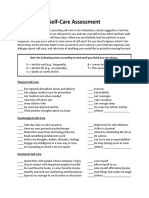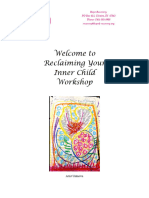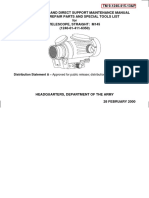Reconnecting With Your Inner Child - 060723
Reconnecting With Your Inner Child - 060723
Uploaded by
Vesela HadzhiyskaCopyright:
Available Formats
Reconnecting With Your Inner Child - 060723
Reconnecting With Your Inner Child - 060723
Uploaded by
Vesela HadzhiyskaOriginal Title
Copyright
Available Formats
Share this document
Did you find this document useful?
Is this content inappropriate?
Copyright:
Available Formats
Reconnecting With Your Inner Child - 060723
Reconnecting With Your Inner Child - 060723
Uploaded by
Vesela HadzhiyskaCopyright:
Available Formats
Reconnec�ng with Your Inner Child
Objec�ve
To reduce unhealthy behaviors by iden�fying ways to reconnect to and nurture your inner child.
What to Know
Inner child healing is a therapeu�c process that involves addressing and resolving emo�onal
wounds, traumas, and unmet needs from your childhood. It recognizes that your experiences
and interac�ons during your forma�ve years can significantly impact your emo�onal well-being
and behavior paterns in adulthood. Your inner child includes all the past developmental stages
that make up your life journey.
Inner child healing aims to reconnect you with your inner child—the younger version of
yourself—to acknowledge pain, validate emo�ons, and provide nurturing and support. The
wounded parts of you may be unconsciously choosing rela�onships with other hurt people. This
may result from experiences you endured while growing up: feeling ignored, rejected,
dismissed, abused, neglected, or trauma�zed. Memories of being alone, scared, and sad can
surface as feelings of abandonment and trauma that con�nue through adulthood. This
wounding changes how you see yourself and the world.
The process of inner child healing can be transforma�ve, leading to increased self-awareness,
emo�onal healing, and a greater sense of wholeness. It enables you to release emo�ons,
rewrite nega�ve narra�ves, and develop healthier coping mechanisms. Ul�mately, inner child
healing helps you reclaim your authen�c self, foster self-love, and create a more fulfilling and
balanced life. By acknowledging and healing past wounds, you can experience personal growth,
emo�onal resilience, and improved rela�onships with yourself and others.
Acknowledging and reconnec�ng with your inner child involves recognizing and accep�ng things
that caused pain in childhood, bringing them to light to understand their impact now. This
worksheet is designed to guide you through the process of exploring your inner child's
emo�ons, experiences, and needs to reduce any unhealthy behaviors that may stem from early
wounding.
What to Do
Visualize Your Inner Child
Close your eyes and take a few deep breaths. Allow yourself to imagine your younger self, the
child version of you, standing in front of you. Take a moment to observe this child and no�ce
their age, appearance, and demeanor. How do they make you feel? What emo�ons arise within
you as you connect with this inner child? Describe this child in as much detail as possible.
______________________________________________________________________________
______________________________________________________________________________
______________________________________________________________________________
Copyright 2023 Between Sessions Resources
______________________________________________________________________________
______________________________________________________________________________
______________________________________________________________________________
Think about challenging experiences or emo�ons from your childhood that s�ll affect you today.
Write down three emo�ons your inner child experienced during those �mes, such as sadness,
disappointment, fear, anger, loneliness, or confusion.
1.____________________________________________________________________________
2.____________________________________________________________________________
3.____________________________________________________________________________
Do you discount or minimize difficult or trauma�c experiences you had in your childhood?
Explain.
______________________________________________________________________________
______________________________________________________________________________
______________________________________________________________________________
Do you protect those who cared for you out of embarrassment, honor, or guilt? Explain.
______________________________________________________________________________
______________________________________________________________________________
______________________________________________________________________________
Do you tend to avoid painful memories? Describe.
______________________________________________________________________________
______________________________________________________________________________
______________________________________________________________________________
Childhood Timeline
It can help to capture a �meline of the key events of your childhood. Focus on the
developmental years from birth to age 21 to iden�fy wounding paterns or specific events that
caused challenges later in your life. Write down any important events and situa�ons. Example:
Age 4 – parents divorced
Age 6 – mom remarried and had a baby
Age 9 – dad moved to Europe
Age 11 – dad became very ill
Copyright 2023 Between Sessions Resources
Age 12 – dad passed away
Age 14 – I started partying and smoking weed
Age 16 – I was arrested
Next to each event or situa�on, rate how emo�onally difficult it was from 1 to 10, where 1 = I
only experienced minor distress, to 10 = This is the greatest distress I have ever experienced.
Use an addi�onal piece of paper if you require more space.
Age Event or Situa�on Ra�ng
(1-10)
Iden�fying Childhood Triggers
Write about a recent situa�on where you responded more strongly than you wished.
______________________________________________________________________________
______________________________________________________________________________
______________________________________________________________________________
Copyright 2023 Between Sessions Resources
Is this a regular occurrence? _________
Where and when did/does it happen? ______________________________________________
How do you feel when this happens?
______________________________________________________________________________
______________________________________________________________________________
______________________________________________________________________________
What body sensa�ons do you experience?
______________________________________________________________________________
______________________________________________________________________________
______________________________________________________________________________
Do you want to react or withdraw? ______________________________
What situa�on from your past does this remind you of?
______________________________________________________________________________
______________________________________________________________________________
______________________________________________________________________________
A Conversa�on with Your Inner Child
Use the following ques�ons to discuss with your earlier self how you felt and your present self
regarding what you are going through now.
How does the younger you feel about what is currently happening in your life?
______________________________________________________________________________
______________________________________________________________________________
______________________________________________________________________________
What could others have done to help you when you struggled as a child?
______________________________________________________________________________
______________________________________________________________________________
______________________________________________________________________________
Copyright 2023 Between Sessions Resources
What can others do to help you now?
______________________________________________________________________________
______________________________________________________________________________
______________________________________________________________________________
Can you accept that you were a child and could not fix the situa�on? Yes / No
What can you do now, as an adult, to appropriately address the problems you are experiencing?
______________________________________________________________________________
______________________________________________________________________________
______________________________________________________________________________
Exploring a Childhood Event
While it can be difficult, it is some�mes helpful to revisit an upse�ng event or situa�on. Answer
the following ques�ons.
What was happening? ___________________________________________________________
How old were you? _______
What was going on in your family at that �me?
______________________________________________________________________________
______________________________________________________________________________
______________________________________________________________________________
Who was involved? ______________________________________________________________
What were the sounds, sights, smells, or feelings?
______________________________________________________________________________
______________________________________________________________________________
______________________________________________________________________________
How did you feel emo�onally?
______________________________________________________________________________
______________________________________________________________________________
______________________________________________________________________________
Copyright 2023 Between Sessions Resources
Are there secrets associated with this situa�on? Explain.
______________________________________________________________________________
______________________________________________________________________________
______________________________________________________________________________
Do you currently carry pain or hurt related to this situa�on? Describe.
______________________________________________________________________________
______________________________________________________________________________
______________________________________________________________________________
What would your inner child like to say to you as an adult?
______________________________________________________________________________
______________________________________________________________________________
______________________________________________________________________________
Daily Journaling
Journaling is a valuable coping tool that offers you �me to reflect on your feelings, thoughts,
and daily ac�ons. Ge�ng thoughts and feelings out of your head can be par�cularly helpful if
you struggle with difficult emo�ons, memories, stress, anxiety, or depression. Using a simple
notebook or journal, choose one or more of the following ques�ons to answer each day.
• What am I grateful for today?
• What have I learned in the past that I found useful today?
• Who supported me in the past that benefited me today?
• What difficult situa�ons in the past helped me overcome obstacles today?
• What five things made me feel peaceful today?
• What does my family admire me for?
• What was the highlight of my day?
• What do I admire about myself?
• What one thing will I forgive myself for this week?
• What three compliments did I receive this week?
• How do I sabotage myself?
• What nega�ve beliefs do I have about myself? Where do they come from?
• What situa�ons do I find most difficult?
• What mistakes do I make and repeat? Why?
• How did I react to an upse�ng situa�on this week?
Can you think of other ques�ons? ____________________________________________
________________________________________________________________________
Copyright 2023 Between Sessions Resources
The Most Helpful Thoughts
Inaccurate and unhelpful thoughts can make your life difficult. This exercise can help you
iden�fy and challenge such thoughts and replace them with more helpful ones.
Iden�fy one unhelpful thought: __________________________________________________
______________________________________________________________________________
What makes it unhelpful?
______________________________________________________________________________
______________________________________________________________________________
______________________________________________________________________________
Replace it with a more helpful thought. ______________________________________________
______________________________________________________________________________
With prac�ce, replacing unhelpful thoughts will become automa�c.
Reflect on Unmet Needs
Write down three unmet needs you had as a child. These needs could include safety, love,
aten�on, valida�on, understanding, or support.
1.____________________________________________________________________________
2.____________________________________________________________________________
3.____________________________________________________________________________
For each unmet need you iden�fied, write down a compassionate and nurturing response that
you can offer to your inner child. Consider how you can fulfill those needs within yourself now
as an adult.
Compassionate and nurturing response for unmet need #1
______________________________________________________________________________
______________________________________________________________________________
How can you fulfill this need as an adult?
______________________________________________________________________________
______________________________________________________________________________
Compassionate and nurturing response for unmet need #2
Copyright 2023 Between Sessions Resources
______________________________________________________________________________
______________________________________________________________________________
How can you fulfill this need as an adult?
______________________________________________________________________________
______________________________________________________________________________
Compassionate and nurturing response for unmet need #3
______________________________________________________________________________
______________________________________________________________________________
How can you fulfill this need as an adult?
______________________________________________________________________________
______________________________________________________________________________
Write a Leter to Your Inner Child
Express love, compassion, and understanding, and apologize for any pain you experienced as a
child. Reassure your inner child that you are here to support and protect them now. Offer words
of comfort, encouragement, and valida�on. Take as much space as you need to express your
feelings and inten�ons toward your inner child. Use an addi�onal piece of paper if necessary.
Dear Inner Child,
______________________________________________________________________________
______________________________________________________________________________
______________________________________________________________________________
______________________________________________________________________________
______________________________________________________________________________
______________________________________________________________________________
______________________________________________________________________________
______________________________________________________________________________
______________________________________________________________________________
______________________________________________________________________________
______________________________________________________________________________
______________________________________________________________________________
Copyright 2023 Between Sessions Resources
______________________________________________________________________________
______________________________________________________________________________
______________________________________________________________________________
______________________________________________________________________________
______________________________________________________________________________
______________________________________________________________________________
Self-Care Prac�ces
Write down three self-care prac�ces you can include in your daily life to nurture and support
your inner child. These prac�ces should help you create a safe and loving space within yourself.
1.____________________________________________________________________________
2.____________________________________________________________________________
3.____________________________________________________________________________
Inner child work is an ongoing process, and this worksheet is just the beginning. Revisit these
exercises and prac�ces whenever you want to reconnect with your inner child. Be pa�ent,
gentle, and compassionate with yourself as you navigate this healing journey.
Reflec�ons on This Exercise
How helpful was this exercise? _____
(1 = not very helpful, 5 = moderately helpful, 10 = extremely helpful)
What did you learn from this exercise?
______________________________________________________________________________
______________________________________________________________________________
______________________________________________________________________________
Copyright 2023 Between Sessions Resources
You might also like
- Identifying Triggers WorksheetDocument1 pageIdentifying Triggers WorksheetMinyak KatsuriNo ratings yet
- Inner Child Healing WorkbookDocument23 pagesInner Child Healing WorkbookRiesgo PsicosocialNo ratings yet
- Healing The Inner Child (Articles)Document39 pagesHealing The Inner Child (Articles)William Harryman100% (13)
- Shadow Work Embracing The Hidden Aspects of Self For Personal GrowthDocument3 pagesShadow Work Embracing The Hidden Aspects of Self For Personal GrowthAnniey MwangiNo ratings yet
- Inner Child Healing GuideDocument16 pagesInner Child Healing Guideaniloztoy2100% (4)
- Inner Child PDFDocument7 pagesInner Child PDFKamal Rajharsha60% (5)
- ST Thomas Aquinas (PDFDrive) PDFDocument250 pagesST Thomas Aquinas (PDFDrive) PDFJoseph Albert Reyes100% (1)
- Inner Child WorksheetsDocument23 pagesInner Child WorksheetsnikolijanaNo ratings yet
- Assertiveness - Assertiveness Practice WorksheetDocument2 pagesAssertiveness - Assertiveness Practice WorksheetNaachiyaar ANo ratings yet
- Wounded Inner Child Nurtured Inner ChildDocument1 pageWounded Inner Child Nurtured Inner ChildCybertertonNo ratings yet
- Self-Care AssesmentDocument2 pagesSelf-Care Assesmentapi-337514528No ratings yet
- Emergency Self-Care Worksheet NEW-2.6.15Document3 pagesEmergency Self-Care Worksheet NEW-2.6.15Ketoki Mazumdar0% (1)
- Inner Child ExerciseDocument1 pageInner Child ExerciseDrBalkrishna Korgaonkar50% (4)
- Self Love Self AbandonmentDocument10 pagesSelf Love Self AbandonmentAna Matias100% (10)
- 200gb Books ListDocument181 pages200gb Books ListTalex9100% (1)
- Transforming The Inner ChildDocument3 pagesTransforming The Inner Childjohn321100% (4)
- Inner Child Homework: Everything About Your Body. So You Can Ask Them Questions. What Does My Body NeedDocument3 pagesInner Child Homework: Everything About Your Body. So You Can Ask Them Questions. What Does My Body NeedNeven VuckovicNo ratings yet
- Self Forgiveness in Addiction Recovery WorksheetDocument3 pagesSelf Forgiveness in Addiction Recovery WorksheetJustine ButlerNo ratings yet
- Midlife Crisis - Signs, Causes, and Coping TipsDocument13 pagesMidlife Crisis - Signs, Causes, and Coping TipsMonyesmaNo ratings yet
- Developing A Growth Mindset Part 1 - AwarenessDocument3 pagesDeveloping A Growth Mindset Part 1 - AwarenessAleksandar DjordjevicNo ratings yet
- 20 Critical Things You Should Never TolerateDocument3 pages20 Critical Things You Should Never TolerateropesNo ratings yet
- How To Learn To Let Go of What You CanDocument5 pagesHow To Learn To Let Go of What You CanSarinah Urip100% (4)
- Full of Self-Love: What's CoveredDocument5 pagesFull of Self-Love: What's CoveredGaby Huerta VlzNo ratings yet
- Introduction To Inner ChildDocument39 pagesIntroduction To Inner ChildLaura Gabriela Mocanu100% (1)
- Understanding The Mother FatherDocument23 pagesUnderstanding The Mother FatherRitika NanwaniNo ratings yet
- What Is Grounding?: Hope 24/7 HandoutDocument4 pagesWhat Is Grounding?: Hope 24/7 HandoutPopescu Andreea100% (2)
- Meeting Your Inner ChildDocument3 pagesMeeting Your Inner ChildDanaTNo ratings yet
- Changing Beliefs (The Table Leg Method)Document3 pagesChanging Beliefs (The Table Leg Method)Aleksandar DjordjevicNo ratings yet
- What Shadow Are You Contending With BDocument2 pagesWhat Shadow Are You Contending With BmartitarioscribdNo ratings yet
- How To Suffer LessDocument4 pagesHow To Suffer LessNICOLAENo ratings yet
- Inner Child JournalDocument19 pagesInner Child JournalAndreea IrinaNo ratings yet
- Identifying Thinking and BehaviourDocument3 pagesIdentifying Thinking and BehaviourHarold LowryNo ratings yet
- 4 Ways To Overcome Your Inner CriticDocument3 pages4 Ways To Overcome Your Inner CriticJerd RodNo ratings yet
- 8 Self EsteemDocument8 pages8 Self EsteemAndy JikhNo ratings yet
- Healing JourneyDocument64 pagesHealing JourneySodfa Ettafakshi100% (8)
- 058 - Ds Relationship Design Part 1 - Class HandoutDocument9 pages058 - Ds Relationship Design Part 1 - Class Handoutnouveauxplaisirs100% (1)
- Avoiding Toxic Relationships in RecoveryDocument4 pagesAvoiding Toxic Relationships in Recoverymelodyfathi100% (1)
- Social Media Advocacy - Somatic TherapiesDocument6 pagesSocial Media Advocacy - Somatic Therapiesdebgbello100% (1)
- Practice Loving Kindness MeditationDocument3 pagesPractice Loving Kindness MeditationgilbertofitotakuNo ratings yet
- Goal Setting and Motivation Workshop BookletDocument17 pagesGoal Setting and Motivation Workshop BookletDilek ENo ratings yet
- 24 01 11 Happiness Challenge FinalDocument12 pages24 01 11 Happiness Challenge FinalinspgadgetNo ratings yet
- Biology of Trauma®15 Practical Tools For ProfessionalsDocument28 pagesBiology of Trauma®15 Practical Tools For ProfessionalsJean AllesieNo ratings yet
- Gratitude A Daily Practice or Joy and AbundanceDocument31 pagesGratitude A Daily Practice or Joy and AbundanceMaverick Ink (Copy Crusader)No ratings yet
- Bowlbys Attachment TheoryDocument39 pagesBowlbys Attachment TheorygatuskevinNo ratings yet
- The Codependency AssessmentDocument13 pagesThe Codependency AssessmentAyanda MmutleNo ratings yet
- Introduction To Secure AttachmentDocument3 pagesIntroduction To Secure AttachmentDea DeaNo ratings yet
- Trauma? Me? What Is Trauma?: Dr. Aimie ApigianDocument23 pagesTrauma? Me? What Is Trauma?: Dr. Aimie ApigianCamila EscobarNo ratings yet
- Things To Know About AngerDocument16 pagesThings To Know About Angersheelkumar_pal429100% (3)
- Inner CriticDocument13 pagesInner Criticmalek matri100% (1)
- Relationship FutureselfjournalDocument23 pagesRelationship FutureselfjournalCarmen Martinez100% (1)
- Grounding and Self Soothing Techniques PDFDocument2 pagesGrounding and Self Soothing Techniques PDFMArko100% (1)
- 10 Strategies For Coping With Childhood Emotional NeglectDocument6 pages10 Strategies For Coping With Childhood Emotional Neglectايمن الرحبي100% (3)
- Pain Free by Design UpdatedDocument50 pagesPain Free by Design UpdatedLaura Henriquez100% (1)
- Goal / Issue Worksheet: Example Phrasing For Issues: Example Phrasing For GoalsDocument1 pageGoal / Issue Worksheet: Example Phrasing For Issues: Example Phrasing For GoalsmhadarNo ratings yet
- Chakra Workbook - Karma GaiaDocument31 pagesChakra Workbook - Karma Gaialannagailfry100% (1)
- 5 Simple Steps To Heal Yourself PDFDocument13 pages5 Simple Steps To Heal Yourself PDFVibhutiGanesh JiNo ratings yet
- Vitamins & Supplements: Vitamins and Their Functions and SourcesDocument18 pagesVitamins & Supplements: Vitamins and Their Functions and Sourceshitesh_tilalaNo ratings yet
- Inner Child WorkshopDocument11 pagesInner Child WorkshopconsciojpNo ratings yet
- Defining Self WorthDocument2 pagesDefining Self WorthJaime LazoNo ratings yet
- Self-Regulation Is The Core of Managing EmotionsDocument5 pagesSelf-Regulation Is The Core of Managing Emotionsjanina100% (4)
- The Compass to Self-Healing - The Self-Help Book: How to Consciously Follow Your Inner Voice to Awaken Your Primal Trust Step by Step and Heal Your Inner ChildFrom EverandThe Compass to Self-Healing - The Self-Help Book: How to Consciously Follow Your Inner Voice to Awaken Your Primal Trust Step by Step and Heal Your Inner ChildNo ratings yet
- Healing Inside Out And Outside In: Finding Zen through Spriritual HealingFrom EverandHealing Inside Out And Outside In: Finding Zen through Spriritual HealingNo ratings yet
- Semi-Infinite Particle Systems With Exclusion Interaction and Heterogeneous Jump RatesDocument32 pagesSemi-Infinite Particle Systems With Exclusion Interaction and Heterogeneous Jump RatesJosefa PeachNo ratings yet
- Unit-2: Operations On Single Random VariablesDocument11 pagesUnit-2: Operations On Single Random VariablesHarini VemulaNo ratings yet
- Structural Design CriteriaDocument15 pagesStructural Design CriteriaAnonymous 3kDy7e100% (1)
- G.R. Nos. 175806 and 175810, October 20, 2010Document22 pagesG.R. Nos. 175806 and 175810, October 20, 2010MATANG PilipinoNo ratings yet
- Rules ReferenceDocument1 pageRules ReferenceVector StrikeNo ratings yet
- 3-Wastewater Flowrates and Constituent LoadingsDocument105 pages3-Wastewater Flowrates and Constituent LoadingsessamNo ratings yet
- Design Project 3 AssignmentDocument4 pagesDesign Project 3 AssignmentHieu Nguyen TriNo ratings yet
- Peh DLL 7TH WKDocument2 pagesPeh DLL 7TH WKRheena-Ann Dupale PadillaNo ratings yet
- 2 25 PBDocument21 pages2 25 PBAwais A. NaveedNo ratings yet
- 4 Research ProposalDocument11 pages4 Research ProposalSiti Nor HasnahNo ratings yet
- Learning Activity Sheet in Mathematics 5 2 Quarter Week 1Document5 pagesLearning Activity Sheet in Mathematics 5 2 Quarter Week 1Mitchz TrinosNo ratings yet
- Process Design Juon Wah 2014 PDFDocument231 pagesProcess Design Juon Wah 2014 PDFL HNo ratings yet
- Cbjeenpu 22Document12 pagesCbjeenpu 22srikantameleka40No ratings yet
- The Six Steps of The Writing ProcessDocument4 pagesThe Six Steps of The Writing ProcessBenjamín Fernando Rodriguez Santana67% (3)
- 68 (Page 683-690)Document8 pages68 (Page 683-690)Sandra NaimNo ratings yet
- Analysis Character Development of The Main Character From The Solo Leveling NovelDocument7 pagesAnalysis Character Development of The Main Character From The Solo Leveling NovelLa DerlinNo ratings yet
- Oceanarium in KochiDocument2 pagesOceanarium in KochiTaniqsha WadhwaniNo ratings yet
- Unit 5 Higher TestDocument2 pagesUnit 5 Higher Testmitio pishtovaNo ratings yet
- Surat Lamaran Saipem EnglishDocument2 pagesSurat Lamaran Saipem EnglishWahyu PrasetyaNo ratings yet
- FA5643 FujiDocument38 pagesFA5643 Fujijose carruitero ruizNo ratings yet
- Manejo Projectos PCISDocument29 pagesManejo Projectos PCISLuis PastranaNo ratings yet
- SF10-JHS Page 2 Of: CertificationDocument2 pagesSF10-JHS Page 2 Of: CertificationLi MonNo ratings yet
- 1st Assignment On PDFDocument16 pages1st Assignment On PDFmohammed abdellaNo ratings yet
- Timetable-Teacher Wise (Physics Department, 2021)Document2 pagesTimetable-Teacher Wise (Physics Department, 2021)Ghulam FaridNo ratings yet
- M145Document256 pagesM145DouglasNo ratings yet
- Find The Syntax Error in The Below Code Without Modifying The LogicDocument8 pagesFind The Syntax Error in The Below Code Without Modifying The LogicsonaNo ratings yet
- Eurelectric-VGB - Facts of Hydropower in The EUDocument12 pagesEurelectric-VGB - Facts of Hydropower in The EUClaudiu BaditaNo ratings yet
- Colant Temp-1Document1 pageColant Temp-1Naing Min HtunNo ratings yet

























































































